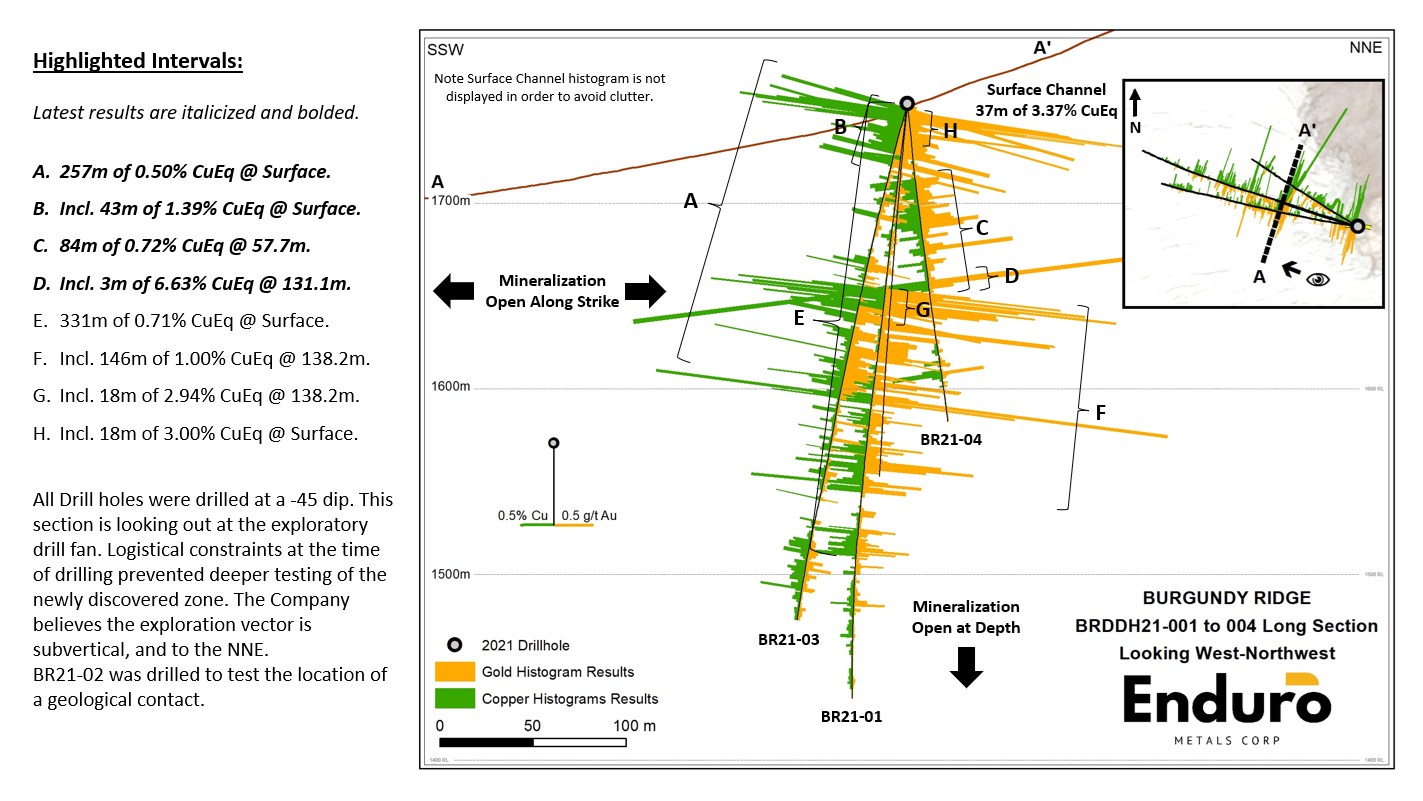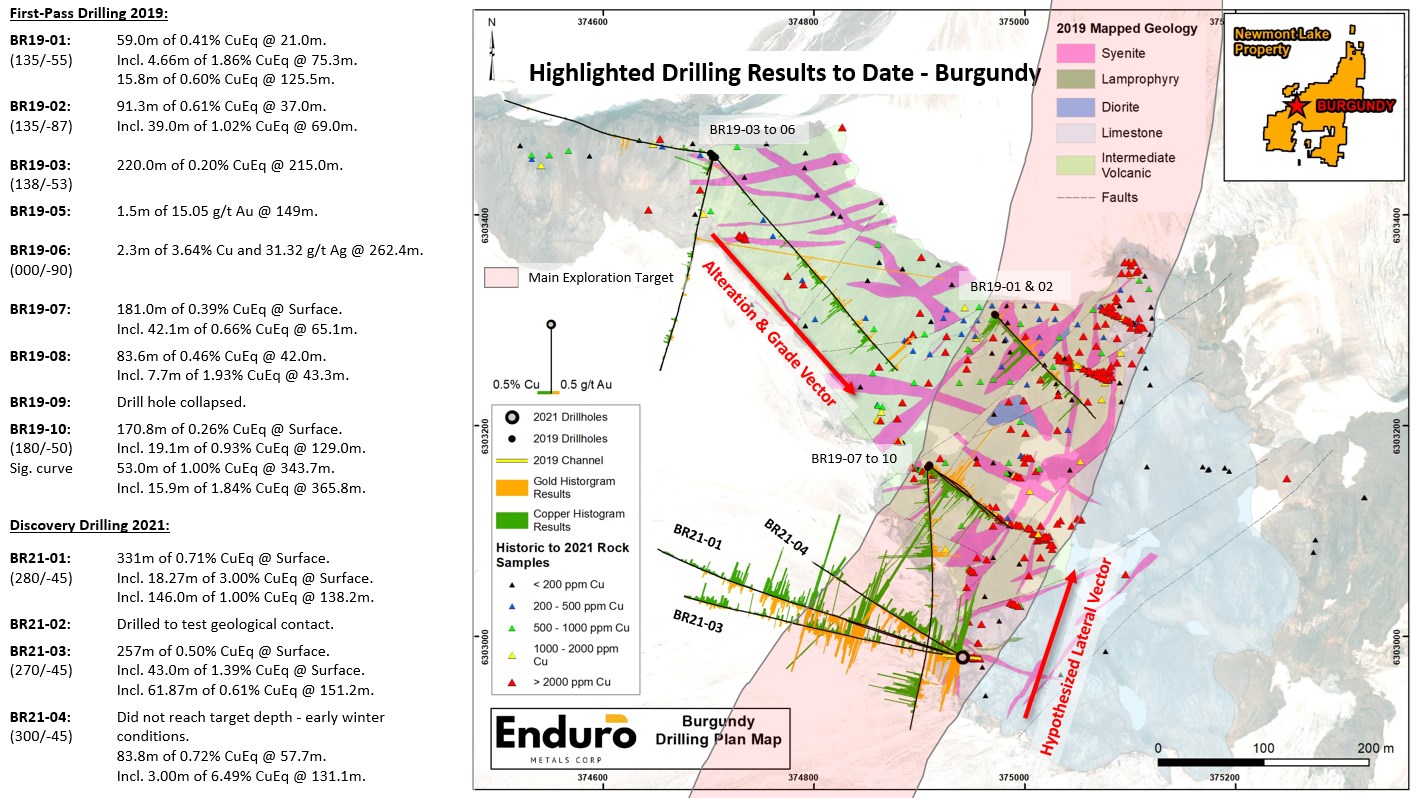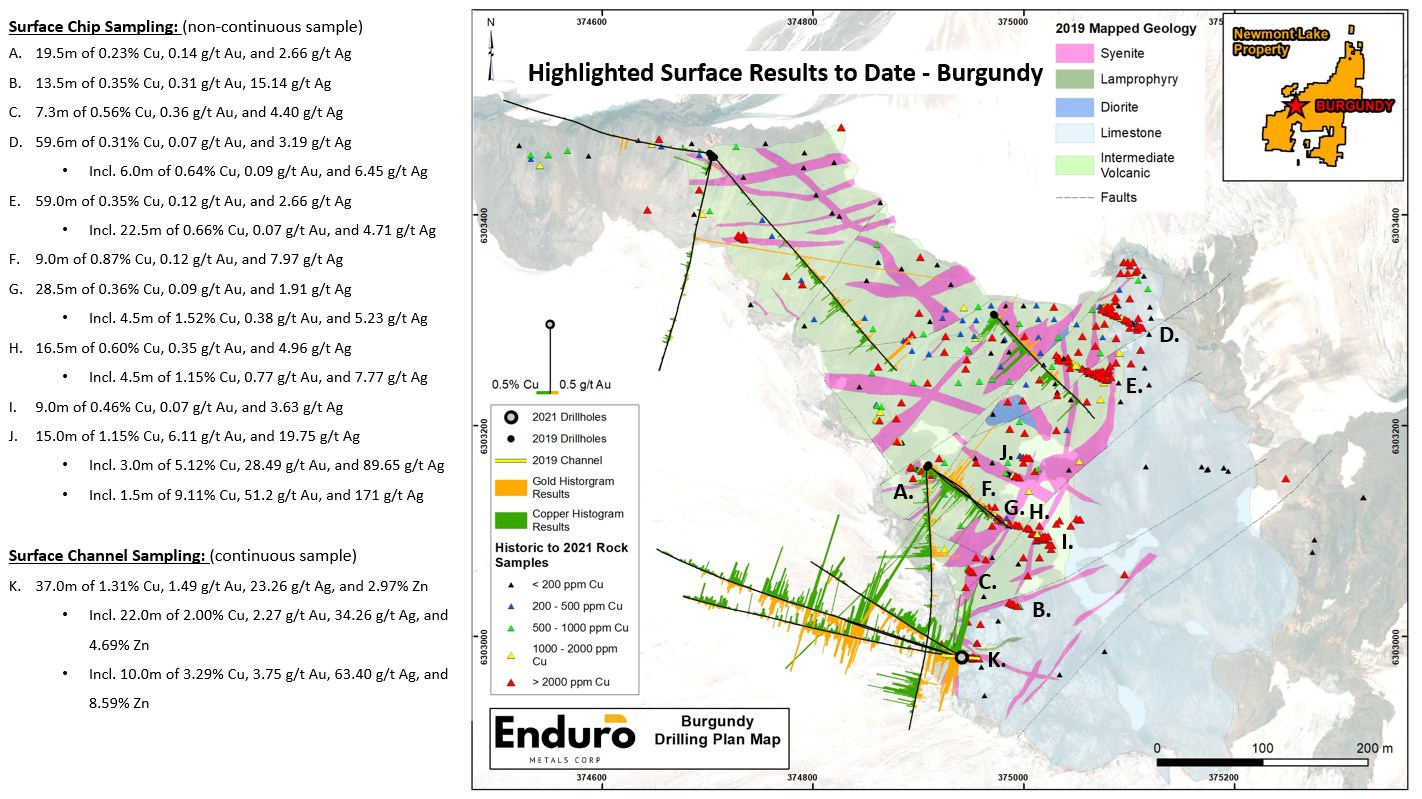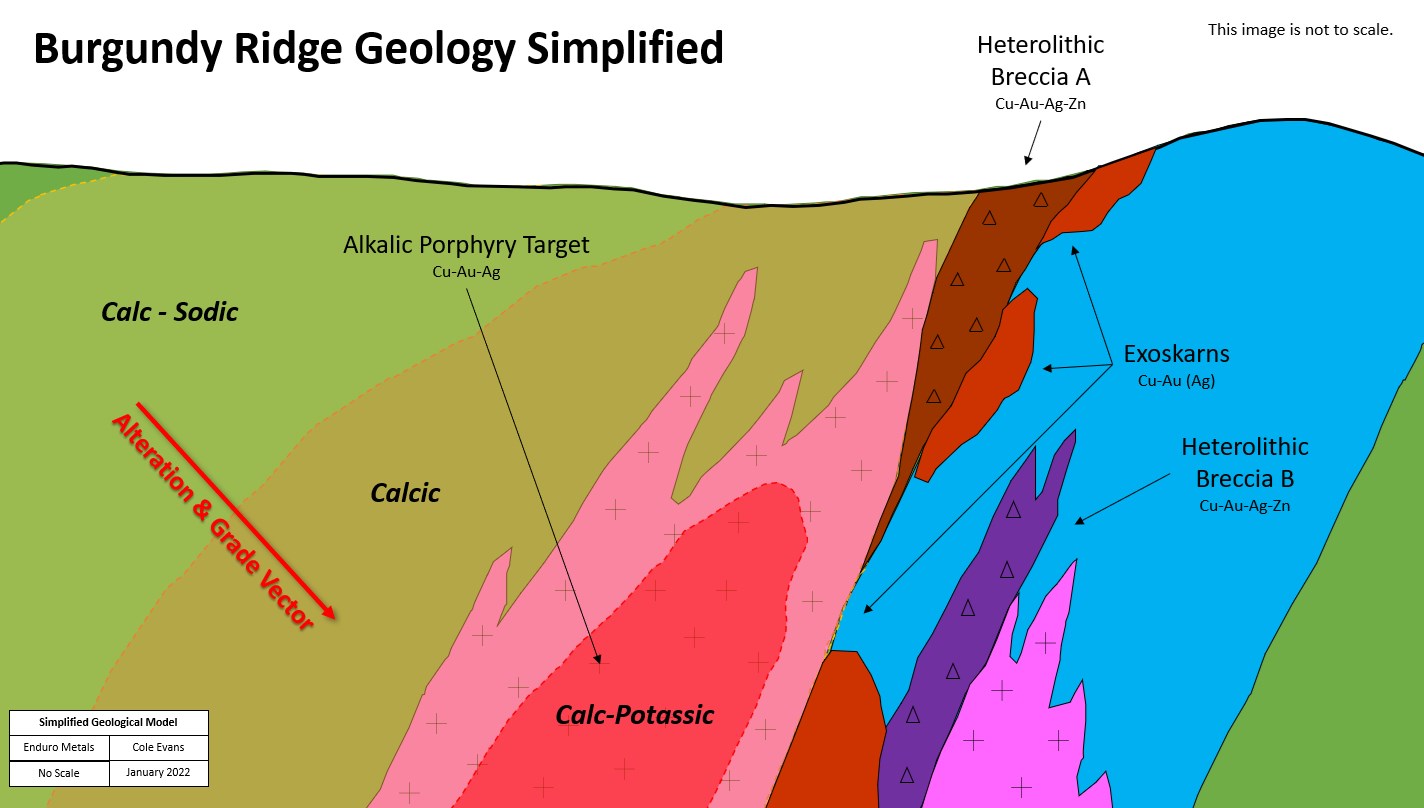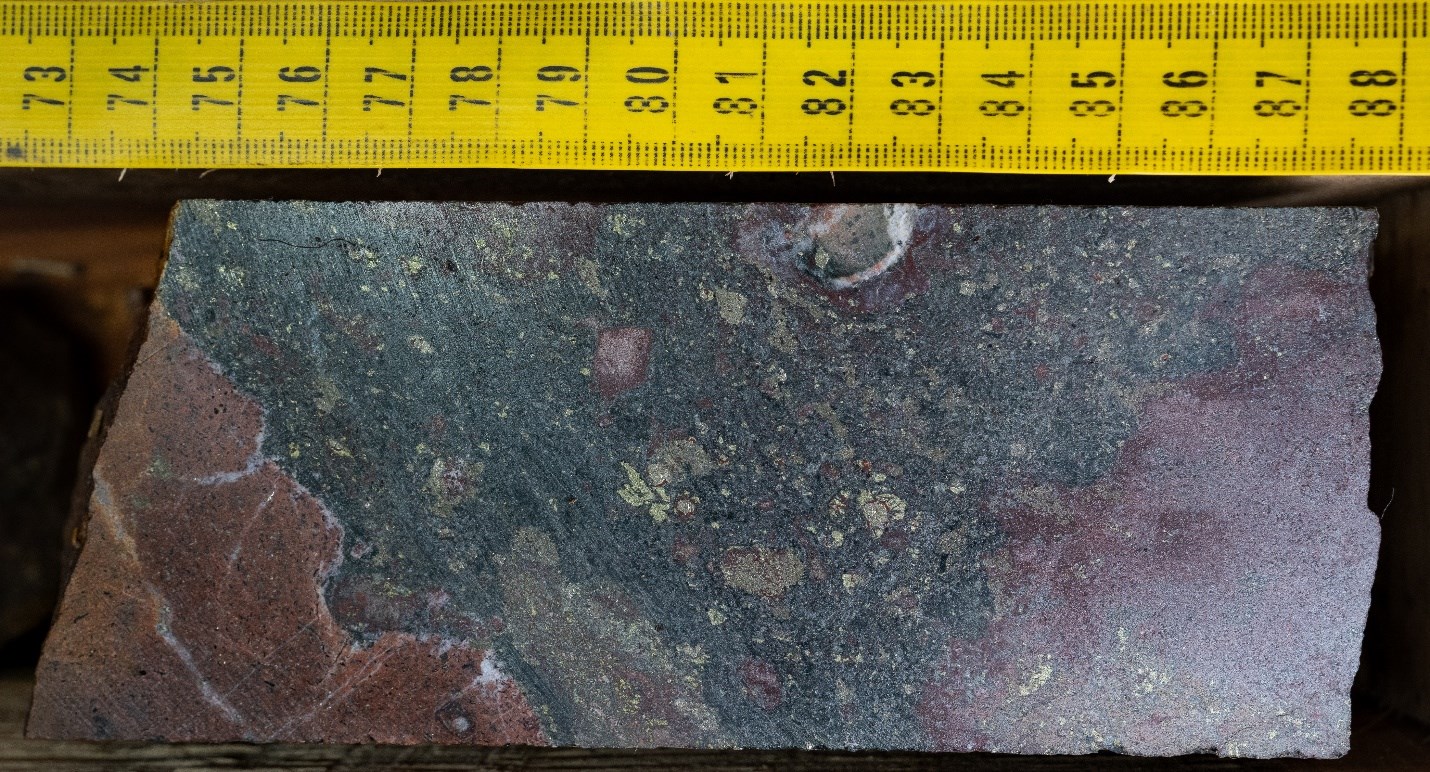Enduro Intersects Mineralization in Multiple Drill Holes Confirming New Porphyry Discovery at Burgundy Ridge

Enduro Metals Corporation (TSXV: ENDR) (OTCQB: ENDMF) (FSE: SOG) (“Enduro Metals” or the “Company“) is pleased to report additional 2021 diamond drilling results which further confirms the discovery of an important alkalic copper/gold porphyry discovery at Burgundy Ridge. Burgundy is 1 of 4 major systems on the Company’s wholly-owned 653 km2 Newmont Lake project in the Golden Triangle of northwestern British Columbia. Results from the other 3 zones on the property are still being accumulated and collated.
Highlights
Newly received assays include:
- BR21-03 which intersected 257m of 0.50% CuEq from surface, including 43m of 1.39% CuEq at surface.
- BR21-04 intersected 84m of 0.72% CuEq from 57m downhole. The drill hole was also successful in identifying another high-grade mineralization style including 6.63% CuEq over 3.00m at 136m downhole. Due to early winter conditions, the drill hole stopped short of target depth while in mineralization.
- These assay results expand on discovery hole BR21- 01 which intersected 331m of 0.71% CuEq from surface, including 18m of 3.00% CuEq at surface, and 146m of 1.00% CuEq at 138m downhole, and 1.80m of 7.30% CuEq at 218.6m (see News Release dated October 18th, 2021).
- ST21-01 intersected 2.17% Cu and 27.07 g/t Ag over 9.37m from 15.92m downhole, including 7.20% Cu and 87.77 g/t Ag over 2.00m. These results were drilled 2.3km NE of Burgundy Ridge and support additional copper potential across the entire Burgundy system.
Results from the latest holes support the discovery of a porphyry copper/gold deposit first announced on October 18th, 2021 (see News Release dated October 18th, 2021). Alteration, mineralization style, and metal assay grades suggest that we are on the periphery of a porphyry system. Enduro continues to evaluate drill core and other data to help vector toward the core of this mineral deposit.
Figure 1:Â Cross-section looking W-NW of 2021 drill fan at Burgundy Ridge discovery. All drill holes on section were drilled at a -45 dip.
Cole Evans, President/CEO of Enduro Metals commented, “Our 2021 drill results from the drill fan at Burgundy Ridge provide compelling evidence of a new silica-undersaturated alkalic porphyry discovery centred between two of BC’s most prolific porphyry camps. This type of porphyry is rare globally, and the cryptic alteration style of alkalic porphyries make them difficult to find. Critical to our success moving forward is the work our technical team has done in developing early understandings of the geological complexities of this system, which we feel closely resembles the neighbouring Galore Creek deposit located 30km arc-parallel from Burgundy to the northwest.
The three most encouraging features about Burgundy include the large scale of the system, the evidence for multiple mineralizing events, and the fact that we are right at the beginning of the discovery phase. The minimum target area so far is 300m wide by at least 1,200m long. Enduro’s drill results are the only exploration record to date and are still very shallow tests for porphyry exploration. The alteration footprint of Burgundy is consistent with a big porphyry deposit, and only more drilling will tell us what we are sitting on.”
Figure 2:Â Plan view map displaying all diamond drill hole assay results to date defining 500m strike length of consistent copper/gold mineralization (open in both directions). The vertical elevation change between BR19-01 drill pad and BR21-01 drill pad is ~100m. The Company believes 2019 drilling drilled overtop of the main mineralized body indicating that steeper and deeper drilling has potential to intersect the main mineralized body as seen in 2021 drilling.
Figure 3:Â Plan view map displaying significant surface results to date at Burgundy Ridge. A combination of drilling and surface sampling shows a consistently mineralized 500m long zone that remains open along strike in both directions and at depth.
Figure 4:Â Simplified geological model of Burgundy Ridge looking north-northeast. This simplified cross-section model is subject to change as more information is acquired.
| Hole ID: | From | To | Interval | Gold (g/t) |
Copper (%) |
Zinc (%) |
Silver (g/t) |
CuEq (%) |
| BR21-01 | 5.47 | 336.90 | 331.43 | 0.35 | 0.29 | 0.49 | 5.5 | 0.71 |
| 5.47 | 23.74 | 18.27 | 1.33 | 1.05 | 2.91 | 21.6 | 3.00 | |
| 138.22 | 344.80 | 206.58 | 0.43 | 0.35 | 0.42 | 8.3 | 0.81 | |
| 138.22 | 284.02 | 145.80 | 0.55 | 0.42 | 0.53 | 8.2 | 1.00 | |
| 218.59 | 220.39 | 1.80 | 3.93 | 3.48 | 4.33 | 84.73 | 7.30 | |
| BR21-02 | Drilled to test geological contact of limestone. Sporadic results include: | |||||||
| New | 8.66 | 9.16 | 0.50 | 1.50 | 1.32 | 4.11 | 29.1 | 3.62 |
| 117.00 | 119.00 | 2.00 | 0.06 | 0.02 | 4.65 | 17.4 | N/A | |
| 127.75 | 128.97 | 1.22 | 0.46 | 0.86 | 1.49 | 8.2 | 1.66 | |
| BR21-03 | 3.00 | 259.50 | 256.50 | 0.26 | 0.21 | 0.31 | 3.9 | 0.50 |
| New | 3.00 | 45.93 | 42.93 | 0.62 | 0.56 | 1.31 | 5.8 | 1.39 |
| 151.20 | 213.07 | 61.87 | 0.41 | 0.29 | 0.14 | 4.26 | 0.61 | |
| BR21-04 | 57.70 | 209.00 | 151.30 | 0.21 | 0.27 | 0.13 | 3.5 | 0.47 |
| New | 57.70 | 141.56 | 83.86 | 0.35 | 0.42 | 0.16 | 5.35 | 0.72 |
| 136.22 | 139.22 | 3.00 | 2.69 | 4.75 | 0.35 | 20.9 | 6.63 | |
| Drill hole did not reach target depth due to early winter conditions. | ||||||||
| ST21-01 | 15.92 | 25.29 | 9.37 | 0.02 | 2.17 | N/A | 27.07 | N/A |
| New | 20.76 | 22.76 | 2.00 | 0.04 | 7.20 | N/A | 87.77 | N/A |
Table 1:Â Reported assay intervals for BR21-01, 02, 03, and 04. Metal prices used in CuEq calculations are as follows: Gold $1670/oz, Silver $21.50/oz, Copper $4.10/lb, and Zinc $1.38/lb. The CuEq formula used for calculations is: CuEq % = (Cu ppm + ((Au ppm * $53.85) / $0.009038960) + ((Ag ppm * $0.69) / $0.009038960) + ((Zn ppm * $0.003042382) / $0.003042382)) / 10,000. True widths are unknown as the mineralized body remains open and requires further drill testing. Recoveries are assumed to be 100% for the purposes of equivalent calculations.
Full assay data is available at www.endurometals.com
Geological Discussion
The geology of Burgundy Ridge is generally described as a series of porphyritic to megacrystic intrusive rocks intruding a calcareous sedimentary sequence adjacent to a 150m – 200m thick limestone horizon. The geology is thought to be moderately dipping west-northwest, but more information is required. Geochronological work on Burgundy was undertaken during the winter of 2020/2021 suggesting intrusive rocks to be coeval with the Galore Creek Suite, which also matches visual interpretations. The host rocks are believed to be Stikine or early Stuhini suite, but more information is required.
The Company contracted the expertise of GeoAqua Consultants led by Dr. Alan Wilson during the 2021 field season to identify and begin characterizing various hydrothermal alteration assemblages at Burgundy Ridge which are as follows: calc-potassic, calcic, calc-sodic, silicification, propylitic, illite, and Fe-carbonate. Further alteration studies are on-going.
Mineralization at Burgundy Ridge is seen in various forms including replacement, disseminated, endoskarns, exoskarns, and a total of 4 uniquely identified mineralized hydrothermal breccias referred to by distinguishable mineral characteristics of respective hydrothermal cements as follows: 1. Chalcopyrite-cemented, 2. Shreddy biotite-cemented, 3. Sphalerite-cemented, 4. Calcite-cemented. These terms are used for classification and are not precise descriptions of the entire nature of each hydrothermal breccia cement. The chalcopyrite and biotite dominant breccias are seen in the calcic to calc-potassic environments whereas the sphalerite and calcite-cemented breccias (referred to as Breccia A and Breccia B in Figure’s 6 & 7) are observed immediately adjacent to the calc-potassic environment proximal to the western contact of the limestone body. It is possible that Breccia A and B are one large breccia body, but further drilling is required to delineate this relationship.
Structural geology of Burgundy is not well understood, but it is generally thought structures strike northeast and dip northwest.
Figure 5:Â Visual example of “replacement-style” mineralization typical of silica-undersaturated alkalic porphyry systems. Sulphide mineralization is characterized by chalcopyrite, pyrite, and sphalerite. This sample assayed 1.80m of 3.48% Cu, 3.93 g/t Au, 84.73 g/t Ag, and 4.33% Zn starting at 218.6m downhole in BR21-01.
Figure 6:Â Visual example of “Breccia A” characterized as a heterolithic hydrothermal breccia with a sulphide dominant cement of sphalerite, chalcopyrite, and pyrite. Clasts within the hydrothermal breccia vary in sulphide replacement intensity and phase. It is noted that the larger, more dominant syenitic clasts host what is thought to be “hypogene” chalcopyrite mineralization, indicating that “Breccia A” is a separate mineralizing event which post-dates a “main-stage” mineralizing event. This sample assayed 0.96m of 2.68% Cu, 3.47 g/t Au, 63.26 g/t Ag, and 8.75% Zn starting at 8.53m downhole in BR21-01.
Figure 7:Â Visual example of “Breccia B” characterized as a heterolithic hydrothermal breccia cemented by calcite, chlorite, sphalerite, chalcopyrite, pyrite, and minor galena. Clasts within the hydrothermal breccia vary from argillic sediments to syenitic intrusions (not visible in photo example). “Breccia B” is located on the eastern contact of the Burgundy Ridge limestone with syenitic and volcanic rocks. This sample assayed 0.83m of 1.54% Cu, 0.29 g/t Au, 56.9 g/t Ag, 5.08% Zn, and 0.88% Pb at 358m downhole in BR19-10. The relationship between Breccia A and B are currently unknown.
QAQC / Analytical Procedures
Core samples from the Newmont Lake Project were sent to MSALABS’ preparation facility in Terrace, B.C., where samples were prepared using method PRP-910. Samples were dried, crushed to 2mm, split 250g and pulverized to 85% passing 75 microns. Prepped samples were sent to MSALABS’ analytical facility in Langley, B.C, where 50g pulps were analyzed for gold using method FAS-221 (fire assay-AAS finish). Gold assays greater than 100 g/t Au were automatically analyzed using FAS-425 (fire assay with a gravimetric finish). Rock samples were analyzed for 48 elements using method IMS-230, multi-element ICP-MS 4-acid digestion, ultra-trace level. Silver assay results greater than 100 g/t Ag and copper, lead, and zinc greater than 10,000ppm were automatically analyzed by ore grade method ICF-6.
Enduro Metals Corp conducts its own QA/QC program where five standard reference material pulps, five blank reference material samples, and two field duplicates are inserted for every 100 samples when analyzing core samples.
Qualified Person
The technical information in this news release has been reviewed and approved by Mr. Maurizio Napoli, P. Geo., Director for Enduro Metals, a Qualified Person responsible for the scientific and technical information contained herein under National Instrument 43-101 standards.
About Enduro Metals
Enduro Metals is an exploration company focused on it’s flagship Newmont Lake Project; a total 638km2Â property located between Eskay Creek, Snip, and Galore Creek within the heart of northwestern British Columbia’s Golden Triangle. Enduro has completed the earn-in under an option agreemnt and now holds a 100% interest (subject only to a royalty on a portion of the property) in 653 square kilometres. Building on prior results, the Company’s geological team have outlined 4 deposit environments of interest across the Newmont Lake Project including high-grade epithermal/skarn gold along the McLymont Fault, copper-gold alkalic porphyry mineralization at Burgundy, high-grade epithermal/skarn silver/zinc at Cuba, and a large 9km x 4km geochemical anomaly hosting various gold, silver, copper, zinc, nickel, cobalt, and lead mineralization along the newly discovered Chachi Corridor.
On Behalf of the Board of Directors,
ENDURO METALS CORPORATION
“Cole Evans”
President/CEO
For further information please contact:
Investor Relations
Sean Kingsley – Director of Communications
Tel: +1 (604) 440-8474
Email:Â info@endurometals.com
https://www.endurometals.com
Neither the TSX Venture Exchange nor its Regulation Services Provider accepts responsibility for the adequacy or accuracy of this release.
Forward-Looking Statements
This news release contains statements that constitute “forward-looking statements” within the meaning of applicable Canadian and United States securities legislation (collectively herein referred to as “forward-looking information”). Such forward looking statements involve known and unknown risks, uncertainties and other factors that may cause Enduro’s actual results, performance or achievements, or developments in the industry to differ materially from the anticipated results, performance or achievements expressed or implied by such forward-looking statements. Forward looking statements are statements that are not historical facts and are generally, but not always, identified by the words “expects,” “plans,” “anticipates,” “believes,” “intends,” “estimates,” “projects,” “potential” and similar expressions, or that events or conditions “will,” “would,” “may,” “could” or “should” occur.
Forward-looking statements in this document includes statements, but is not limited to results, analyses and interpretations of exploration and drilling programs; our grassroots exploration program, our mining (including mining methods), expansion, exploration and development activities, geological and mineralization interpretations and the plans, results, costs, and timing thereof. Although Enduro believes the forward-looking information contained in this news release is reasonable based on information available on the date hereof, by their nature forward-looking statements involve assumptions, known and unknown risks, uncertainties and other factors which may cause our actual results, performance or achievements, or other future events, to be materially different from any future results, performance or achievements expressed or implied by such forward-looking statements.
Examples of such assumptions, risks and uncertainties include, without limitation, assumptions, risks and uncertainties associated with general economic conditions the effect of a pandemic and particularly the COVID-19 outbreak as a global pandemic on the Company’s business, financial condition and results of operations and the impact of the COVID-19 outbreak on our workforce, suppliers and other essential resources and what effect those impacts, if they occur, would have on our business, financial condition and results of operations; assumptions regarding expected capital costs, operating costs and expenditures, production schedules, economic returns and other projections; adverse industry events; future legislative and regulatory developments in the mining sector; the Company’s ability to access sufficient capital from internal and external sources, and/or inability to access sufficient capital on favorable terms; mining industry and markets in Canada and generally; the ability of Enduro to implement its business strategies; competition; and other assumptions, risks and uncertainties.
This list is not exhaustive of the factors that may affect any of our forward-looking information. Although we have attempted to identify important factors that could cause actual results, actions, events, conditions, performance, or achievements to differ materially from those contained in forward-looking information, there may be other factors that cause results, actions, events, conditions, performance, or achievements to differ from those anticipated, estimated or intended.
The forward-looking information contained in this news release represents the expectations of the company as of the date of this news release and, accordingly, is subject to change after such date. Readers should not place undue importance on forward-looking information and should not rely upon this information as of any other date. While the Company may elect to, it does not undertake to update this information at any particular time except as required in accordance with applicable laws.
For US Investors
Enduro Metals cautions that this release has been prepared in accordance with the requirements of the securities laws in effect in Canada, which differ from the requirements of U.S. securities laws. Information included in this media release have been prepared in accordance with Canadian National Instrument 43-101 Standards of Disclosure for Mineral Projects (“NI 43-101”). NI 43-101 is a rule developed by the Canadian Securities Administrators which establishes standards for all public disclosure an issuer makes of scientific and technical information concerning mineral projects. Canadian standards, including NI 43-101, differ significantly from the requirements of the United States Securities and Exchange Commission (SEC) and information contained herein may not be comparable to similar information disclosed by U.S. companies.

